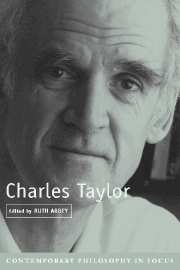Book contents
- Frontmatter
- Contents
- List of Contributors
- Acknowledgments
- Introduction: Timely Meditations in an Untimely Mode - The Thought of Charles Taylor
- 1 Taylor and the Hermeneutic Tradition
- 2 Taylor's (Anti-) Epistemology
- 3 The Self and the Good: Charles Taylor's Moral Ontology
- 4 Articulating the Horizons of Liberalism: Taylor's Political Philosophy
- 5 Toleration, Proselytizing, and the Politics of Recognition: The Self Contested
- 6 Taylor and Feminism: From Recognition of Identity to a Politics of the Good
- 7 Catholicism and Philosophy: A Nontheistic Appreciation
- 8 Taylor, “History”, and the History of Philosophy
- Bibliography
- Index
4 - Articulating the Horizons of Liberalism: Taylor's Political Philosophy
Published online by Cambridge University Press: 05 June 2012
- Frontmatter
- Contents
- List of Contributors
- Acknowledgments
- Introduction: Timely Meditations in an Untimely Mode - The Thought of Charles Taylor
- 1 Taylor and the Hermeneutic Tradition
- 2 Taylor's (Anti-) Epistemology
- 3 The Self and the Good: Charles Taylor's Moral Ontology
- 4 Articulating the Horizons of Liberalism: Taylor's Political Philosophy
- 5 Toleration, Proselytizing, and the Politics of Recognition: The Self Contested
- 6 Taylor and Feminism: From Recognition of Identity to a Politics of the Good
- 7 Catholicism and Philosophy: A Nontheistic Appreciation
- 8 Taylor, “History”, and the History of Philosophy
- Bibliography
- Index
Summary
In Sources of the Self, his epic historical recounting of the making of our modern moral identity, Charles Taylor attempts to articulate the broader background or horizon (what he there calls the moral ontology) of the specific arrays of moral judgement characteristic of modernity in the West. Without such an ontology, he argues, those judgements can neither secure their distinctive content nor receive a truly rational assessment of their strengths and limitations; and yet many forces fundamental to that same modernity (certain pervasive metaphysical, epistemological and moral assumptions) nevertheless encourage us to ignore or positively repress it. In other words, Taylor sees his overarching project in that book as one of opposing an ethics of inarticulacy. The intuition that guides my necessarily selective consideration of Taylor's wide-ranging and extraordinarily influential contributions to political philosophy is that they can be seen as a contribution to that broader project. Where Sources of the Self aims at nothing less than an articulation of the moral sources of the modern conception of selfhood, the essays and lectures in political philosophy that I examine can fruitfully be conceived as attempts to articulate the horizons of a single, but fundamental, strand in the weave of that modern self-identity – the political theory and practice of liberalism.
My discussion falls into three parts. In the first, I examine Taylor's critiques of Isaiah Berlin on negative freedom and Robert Nozick on the primacy of individual rights.
- Type
- Chapter
- Information
- Charles Taylor , pp. 105 - 126Publisher: Cambridge University PressPrint publication year: 2004
- 6
- Cited by



